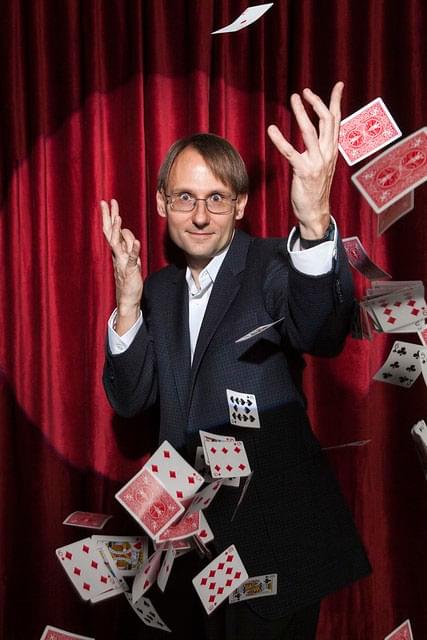Professor Sven Koenig
Sven Koenig, Ph.D., FAAAI is Professor in Computer Science at the University of Southern California.
Sven earned his Ph.D. degree in computer science from Carnegie Mellon University for his dissertation on “Goal-Directed Acting with Incomplete Information”. He also holds M.S. degrees from the University of California at Berkeley and Carnegie Mellon University. He is a fellow of the Association for the Advancement of Artificial Intelligence (AAAI), a distinguished speaker of the Association for Computing Machinery (ACM) and the recipient of an ACM Recognition of Service Award, an NSF CAREER Award, an IBM Faculty Partnership Award, a Charles Lee Powell Foundation Award, a Raytheon Faculty Fellowship Award, a Mellon Mentoring Award, an SAIC Student Advisement Award, both AAAI and WIC Certificates of Appreciation, a Fulbright Fellowship and the Tong Leong Lim Pre-Doctoral Prize of the University of California at Berkeley.
He was also a program director at the National Science Foundation (NSF) from 2010 to 2012, where he received the Director’s Award for Collaborative Integration in both 2011 and 2012. Several of his students won awards as well (including best paper, best dissertation, best research assistant, and best teaching assistant awards) and took their first jobs in academia.
Sven is interested in intelligent systems that have to operate in large, nondeterministic, nonstationary, or only partially known domains. Most of his research centers around techniques for decision making (planning and learning) that enable single situated agents (such as robots or decision-support systems) and teams of agents to act intelligently in their environments and exhibit goal-directed behavior in real-time, even if they have only incomplete knowledge of their environment, imperfect abilities to manipulate it, limited or noisy perception, or insufficient reasoning speed. He believes that finding good solutions to these problems requires approaches that cut across many different fields and, consequently, his research draws on areas such as artificial intelligence, decision theory, and operations research. Applications of his research include robotics and video games as well as planetary exploration, supply-chain management, and crisis management (such as oil-spill containment).
Sven has edited several conference proceedings and published more than 150 papers in various areas of artificial intelligence and robotics, including more than 30 papers at AAAI and IJCAI (the two main artificial intelligence conferences), as well as papers in planning (ICAPS and its predecessors AIPS and ECP), agents (AAMAS and its predecessor Autonomous Agents), machine learning (ICML, COLT), numerical artificial intelligence and control (NIPS, UAI, AI and Mathematics), knowledge representation and reasoning (KR), robotics (ICRA, IROS, RSS), games (AIIDE, FDG) and others.
He was conference co-chair of the 2002 Symposium on Abstraction, Reformulation, and Approximation (SARA), conference co-chair of the 2004 International Conference on Automated Planning and Scheduling (ICAPS), program co-chair of the 2005 International Joint Conference on Autonomous Agents and Multi-Agent Systems (AAMAS), and program co-chair of the 2007 and 2008 AAAI Nectar programs. He is a councilor of the Association for the Advancement of Artificial Intelligence, an editor of both AI Magazine and Artificial Intelligence, an associate editor of the Journal of Autonomous Agents and Multi-Agent Systems, Journal on Advances in Complex Systems (ACS), and Computational Intelligence, a member of the advisory board of the Journal of Artificial Intelligence Research (JAIR), a member of the steering committee of SARA, a former associate editor of JAIR and a former member of the advisory committee of Americas School on Agents and Multiagent Systems and the executive committee of ICAPS.
Sven cofounded Robotics: Science and Systems (RSS), a highly selective robotics conference, in 2005, and subsequently served on both the board of directors and the advisory board of the Robotics: Science and Systems Foundation. He also cofounded the International Symposium on Combinatorial Search (SoCS), the first regular meeting of the search community in artificial intelligence, in 2009 and now serves on its governing council.
Sven is passionate about helping students and young researchers to get a good start in their careers. On the high school level, he repeatedly represented the Association for the Advancement of Artificial Intelligence (AAAI) as a judge at ISEF, which brings together over 1,400 high school students from more than forty nations. On the university level, he often serves as external member on dissertation committees, was three times co-chair of the AAAI student abstract and poster program, often participates as panelist or mentor in doctoral consortia of artificial intelligence conferences, was a member of award committees of major artificial intelligence conferences and journals, and frequently presents tutorials about his research at summer schools and conferences.
He co-organized many USC Programming Contests and trained USC students for several Regional ACM Programming Competitions, including where they placed 2nd out of 73 teams in 2006 and 1st out of 75 teams in 2012 (and went on to the world finals). At NSF, he helped to manage the Research Experiences for Undergraduates (REU) Sites program and helped to initiate the NSF European Extended Lab Visit Program for Graduate Students in Artificial Intelligence and Robotics.
In his spare time, Sven used to care for more than fifty newts from all over the world. He is also a member of the Academy of Magical Arts at the Magic Castle in Hollywood, but has not yet managed to make all (or even some) of his work disappear. His Erdös number is two.
Sven coedited Abstraction, Reformulation, and Approximation: 5th International Symposium, SARA 2002, Kananaskis, Alberta, Canada, August 2–4, 2002, Proceedings, authored Making Good Decisions Quickly, and coauthored Incremental Heuristic Search in AI, Probabilistic robot navigation in partially observable environments, A layered architecture for office delivery robots, Improved fast replanning for robot navigation in unknown terrain, and Xavier: A robot navigation architecture based on partially observable markov decision process models. Read the full list of his publications!
Read his LinkedIn profile and his Wikipedia profile.
